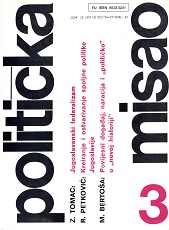Austrijsko-jugoslavenski privredni odnosi
Economic Relations Between Austria and Yugoslavia
Author(s): Waltraut UrbanSubject(s): Political Sciences, International relations/trade, Political economy, Economic development, Tourism
Published by: Fakultet političkih znanosti u Zagrebu
Keywords: Economic Relations; Austria; Yugoslavia;
Summary/Abstract: After the Second World War the economic relationships between Austria and Yugoslavia have considerably increased but proportionately they have diminished in comparison to relationships with other trade partners. In this article some of the most important activities within these relations will be discussed. External trade relations are noticeably asymmetrical. Austrian export, to Yugoslavia is much larger than the import of Yugoslav products, which means that the relative significance of Austria for Yugoslav export has dropped. Also, the structure of export goods is unfavourable for Yugoslavia: Yugoslavia imports more elaborate goods while exporting mainly raw materials, energy, and half¬ -finished products. Second only to West Germany. Austria supplies the greatest number of tourists visiting Yugoslavia. The financial effects are positive for Yugoslavia, although there has been some decrease in the recent years. Workers from Yugoslavia are the largest group of foreign labour In Austria. »Workers' Remittances« are the most important source of Austrian Schillings for Yugoslavia. The total value of remittances results from the number of workers, their family ties, and the foreign exchange policy of Yugoslavia. The financial relationships between the two countries are characterized by Austria's role as creditor: Austrian banks claim 6% of the total sum of Yugoslav debts. Does the fact that Austria and Yugoslavia are neighbouring countries affect their economic and oilier relationships in a positive manner? Proximity is evidently a positive factor for tourism and labour migration but is not very important for economic and financial relationships. In the case of Austria and Yugoslavia these are more fully influenced by international and national political factors and by the difference in the respective degree of industrialization and development.
Journal: Politička Misao
- Issue Year: XXIII/1986
- Issue No: 03
- Page Range: 58-82
- Page Count: 25
- Language: Croatian

